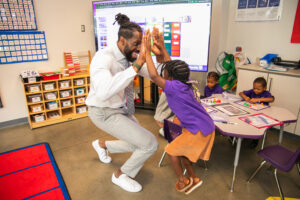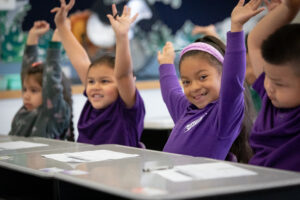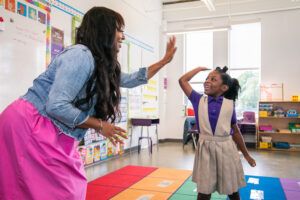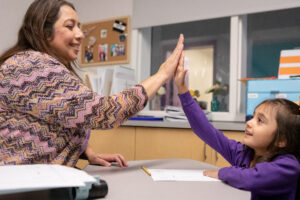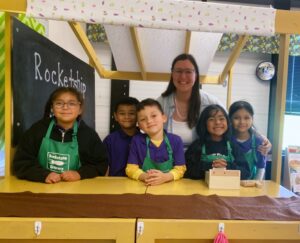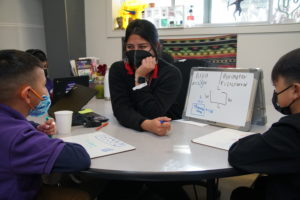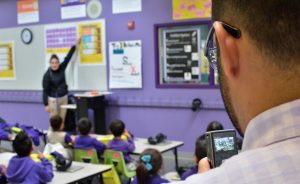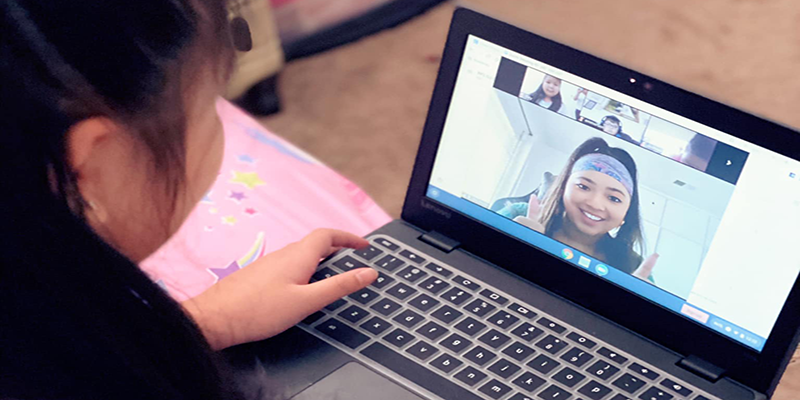
8 Ways Educators Can Excel During Distance Learning
Jordan Blanton, Associate Director of Humanities
Like many, our Rocketship teachers greatly miss connecting with students in person. But as the coronavirus pandemic continues, so do our tireless efforts to offer engaging, high-quality education virtually.
Ask any educator you know, and you’ll likely hear teaching virtually is no easy feat. Thankfully, our school leaders and teachers pivoted quickly, and collaboratively came up with fresh ideas to make distance learning a dynamic experience. Here, teachers hold students accountable while boosting engagement, facilitating growth, and offering 1:1 check-ins.
However, many teachers, especially those new to the role, are seeking tips during this time. So to support the wider education community, we compiled these eight ways educators can help students thrive while learning from home.
1. Kick-off your meeting early with a friendly competition.
Let students know that if they log in to your video meetings 10 minutes before the start time, there will be some friendly competition. Use Quizlet or Kahoot to get their brains warmed up and ready to go. When you start on a high note, your lesson will begin on time and with high attendance.
2. Set clear and consistent expectations.
Invest students in virtual meeting “norms” by co-creating the agreements together. For starters, it’s helpful to be clear on what you want to see and hear students doing during your meetings. They should be in a well-lit room, out of bed, and dressed for success with their videos on, faces in the frame, and ready to engage. Once you establish those basics, ask them to generate ideas about what our actions and behaviors should be. Dig deeper by pushing them to think about why those actions are important. Start each lesson with the agreed-upon norms typically (3-5) and hold students accountable for upholding them. You might be delightfully surprised when they start to hold each other accountable too.
3. Launch every class with a celebration!
Reinforce the transferable strategies that students used by spotlighting student work when you launch your video meeting. Take a picture and include it in your slide deck to make the work and feedback visible. Visibility into excellent work will make the feedback concrete for students. Let yourself get creative with celebrations. Many of our teachers use TikTok to announce students who passed exams or spotlight those who’ve made great strides week over week.
4. Stamp the behavior you want students to repeat.
At Rocketship, we teach the “reader” and “writer” in our students, instead of teaching the actual “reading” and “writing” itself. This means that the skills and strategies found in our lesson plans can be “transferred” or applied to a variety of contexts. When students demonstrate transferable thinking, we make sure to let the entire class know. Doing so ensures that we are teaching to the future and building independence in our students.
For example, if a student analyzes a character in a fictional story, then the teacher will want to “stamp” this “transferable thinking” to ensure that all students continue to apply it to any future text within this genre. Therefore, the teacher might say something like, “Great fiction readers always pay attention to the characters in the story to understand the lesson more deeply. Did you notice how ______ student did a wonderful job paying close attention to the relationship between our characters in order to better understand the problem of the story? Make sure to keep doing that every time you read fictional stories! Doing so will help you unpack the lesson the author is trying to convey!”
By “stamping” the transferable thinking, students will be able to build strong reading and writing habits that extend to any text they encounter or write in the future.
5. Give individual feedback.
Let students know that their independent work matters and it’s not just to keep them busy at home. Using platforms like Seesaw and Google Classroom will allow you to easily review work and leave comments. These individual touchpoints go beyond accountability and are essential to reinforce skills. This practice sends the message to students that you care enough about them to analyze their work. Plus, there is an added bonus of gathering trends, so you can address misconceptions the following day.
6. Hold time for 1:1 connections.
Setting up a consistent time to call or “Zoom” with your students is a great way to keep students engaged and connected. At Rocketship, students meet with their Humanities and STEM teachers at least once per week. Some students engage with a teacher a least once a day in a small group or individual setting. These calls start with care by asking about a student’s general well-being. Then, they segway into coaching opportunities to help students with their academic tasks. For English learners, this is an opportunity to explicitly teach language, so that students can fully access the content. As a result, students know that you care about them as a person, value the work they are creating, and want to see them be successful.
7. Engage parents often.
Consistent teacher-parent communication is incredibly important during distance learning. Keep parents in the loop on what their child’s weekly learning goals are to hold students accountable. Teachers can utilize communication features in Seesaw, the multilingual Talking Points app, or texting to keep parents informed on their child’s progress and struggles.
8. Schedule time for self-care during and after the school day.
As educators who deeply care about our students, it’s easy to put off personal care. Yet, as distance learning stretches on, it’s critical to carve out time to decompress and take care of you. Make sure you’re taking small screen breaks throughout the day to reset and a full lunch break. Set recurring reminders on your calendar to end the workday and spend time doing things that fulfill you or connect with family. After all, in order to expect the best of our students we have to show up each day mentally replenished, as well.
While our educators have learned many lessons and codified best practices from the spring 2020 distance learning experience, we’re always looking to improve the experience for students, families, and teachers and will continue to share helpful insight as the school year progresses. Here’s to another year of unleashing potential together!
Published on August 24, 2020
Read more stories about: Uncategorized.
In the Classroom
How to Foster a Growth Mindset in the Classroom
Jeremiah Davis, Paraprofessional, Rocketship Dream Community Prep | April 10, 2025
Learn how to cultivate reflection, embrace challenges, and promote perseverance in yourself and in your students.
Read more ⟩How to Improve School Culture
Jeremiah Davis, Paraprofessional, Rocketship Dream Community Prep | March 3, 2025
Ready to ramp up moral at your school? Weave these nine celebrations into your school year!
Read more ⟩How Coaching in Schools Improves Outcomes
Rockesthip Public Schools | Feb 4, 2025
Learn how live coaching and weekly feedback sessions can help your teachers feel more supported year round!
Read more ⟩Parent Conference Tips for First Year Teachers
Jeremiah Davis, Paraprofessional, Rocketship Dream Community Prep | January 6, 2025
Looking for top parent conference tips? Prepare with advice from our educators.
Read more ⟩First Year Teacher? Here are Five Mistakes to Avoid.
Jeremiah Davis, Paraprofessional, Rocketship Dream Community Prep | November 1, 2024
See what mistakes most first year teachers make and how you can get ahead this school year with some simple tips from a fellow educator.
Read more ⟩3 Classroom Systems New Teachers Swear By
Rocketship Public Schools | Sept. 30, 2024
As a first year teacher, establishing a smooth and productive classroom environment can feel a tad overwhelming. Thankfully, these simple strategies can go a long way.
Read more ⟩How Co-Teacher Collaboration Can Benefit Your Classroom
Featuring Alejandra Chavez, Education Specialist at Rocketship Mosaic Elementary | June 10, 2024
Hear from Ms. Aly about how a small team of educators can make a big difference in student outcomes through thoughtful planning, focused collaboration, and personalized accommodations. Ms. Aly was one of our highest-performing educators in California for the 23-24 school year.
Read more ⟩How to Spark Joy in ESL Classrooms with a Multilingual Learning Clubhouse
Featuring Ms. Amy De La Rosa, Multilingual Specialist, Nashville Northeast Elementary | June 1, 2023
Listen in to an audio interview with Amy De La Rosa, a Multilingual Specialist who has worked as an educator for over 14 years and found an innovative way to help her students learn English in a more accelerated, playful way.
Read more ⟩Supporting Parents of Multilingual Students in Family/Teacher Conferences
Emma Volpe, Rocketship United Academy | June 1, 2022
Get thoughtful insight on how to create a more inclusive family-teacher conference environment.
Read more ⟩5 Ways to Strengthen Relationships in the Classroom
James Cross, Assistant Principal, Rocketship Nashville Northeast Elementary | February 20, 2022
A new age of education calls for a new level of connection. Here are some key tips to strengthen relationships in your classroom this school year.
Read more ⟩5 Ways School Leaders Can Coach and Support Teachers
Eesir Kaur, Director of Professional Development | October 15, 2020
Are you a school leader looking to coach your teachers more effectively? Here's what works for us.
Read more ⟩



